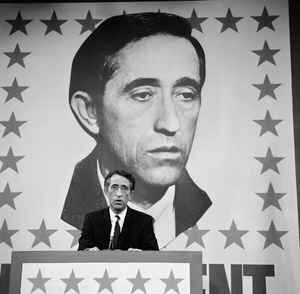PAT PAULSEN FOR PRESIDENT!
NAPA, CA — MARCH 1968 — On a sunny spring day, as the 1968 presidential campaign rolled on, 2,000 people gathered at a political rally in California’s wine country. Cheers rose as the candidate stepped to the podium. He waved, flashed a weak grin, then began.
He was neither Democrat nor Republican, he said. His party was the Straight Talkin’ American Government Party, the STAG Party. “Are you right-wing or left-wing?” someone asked. “Neither,” he said. “I’m kind of middle of the bird. Too much left-wing, too much right-wing and you fly around in concentric circles.”
Two score and 15 years ago, a lone man with a unique vision for America made a unique run for the presidency. He was not a hero, “just a common, ordinary, simple savior of America's destiny.” For nine months, while the actual campaign slithered toward the White House, this simple savior won no primaries, earned no endorsements. But he got all the laughs. In 1968, Pat Paulsen for President was just what America needed.
Like any dark horse, Paulsen came from the shadows. Playing comedy clubs, he perfected a deadpan self-mockery. As a faux folksinger, he got fingers tangled in guitar strings. He sang “Try to Remember,” then paused, stuck for the next line.
His act attracted two rising comedians, Tom and Dick Smothers. They sang Paulsen’s songs — “I fell in a vat of chocolate. . .” — and when they came to network television, the brothers put him on their show. His editorials, delivered in a nervous, mealy-mouthed patois, made him a star.
GUN CONTROL: “Let’s face it — we need guns. You never can tell, you’re walking down the street, you’ll spot a moose. And how about suicide? Can you imagine trying to beat yourself to death with a stick?”
Each editorial saw Paulsen dissolve into doublespeak. Watch:
Then in January 1968, Smothers Brothers headwriter Mason Williams conceived a mock presidential campaign. Like all campaigns back then, Paulsen’s began with denial. “True, all the present candidates once denied they had any intention of running. But the fact that I am also a liar, doesn't make me a candidate.”
Week after week, Paulsen appeared on the show, lying, denying, cheering himself on. Finally on March 3, 1968. . .
He had done his best, he said, “to dispel these rumors, rumors of the worst kind. True rumors.” Throwing his hat in the ring, he proclaimed: “Now I ask you: Will I solve our economic problems? Will I ease the causes of racial tension? Will I bring a peaceful end to Vietnam? Sure, why not?”
On a whistle-stop tour, Paulsen spoke to small crowds, held press conferences, and made speeches that sounded real — until the punch line. “We’ve upped our standards. Now up yours.”
With slogans “United We Sit” and “We Can’t Stand Pat,” Paulsen campaigned across the country. Disgusted with politics, Americans got in on the joke, giving him keys to the city, cheering at rallies, asking serious questions. He earned dozens of write-in votes in primaries. And he stayed on message.
“I think marijuana should be licensed and kept out of the hands of teenagers. It’s too good for them.”
“It’s time in this campaign to stop the petty bickering and get down to some serious mud-slinging and some serious name calling.”
On Sunday night before the election, CBS ran an hour-long Pat Paulsen for President info-mercial. There was the candidate posing at the Lincoln Memorial, peering through the gates of the White House, telling a crowd, “We have nothing to fear but fear itself, and the boogy man.”
No one knows how many write-ins Paulsen received, but Democrat Hubert Humphrey later told Paulsen that his antics cost him the election. Paulsen never knew whether Humphrey was serious. In April 1969, after battling CBS censors, the Smothers Brothers Comedy Hour was canceled. That June, the show’s writers (including Steve Martin, John Hartford, and Mason Williams) won the Emmy for Outstanding Writing Achievement.
But Paulsen was not done in by defeat. Every four years, running again, he made the talk show circuit. In 1976, he told a Tonight Show audience that he planned to vote for the disgraced Richard Nixon “because I want to know where he is at all times.”
Paulsen receive more write-ins, including some 10,000 in the 1992 GOP primaries. Four years later, his 921 write-ins in New Hampshire made him runner-up to Bill Clinton.
“Whenever I’d walk around with him,” Tom Smothers said, “people would yell, ‘Hey, Mr. President.' We miss him.”
Only the grim reaper stopped Paulsen from running. In 1997, he died of colon cancer. Today, the legacy lives on in the Pat Paulsen for President website. “Pat's campaign was based in comedy,” the site observes, “and he ran it using outright lies, double talk and unfounded attacks on his challengers. Who thought that this style would be the method of campaigns in the future?”











